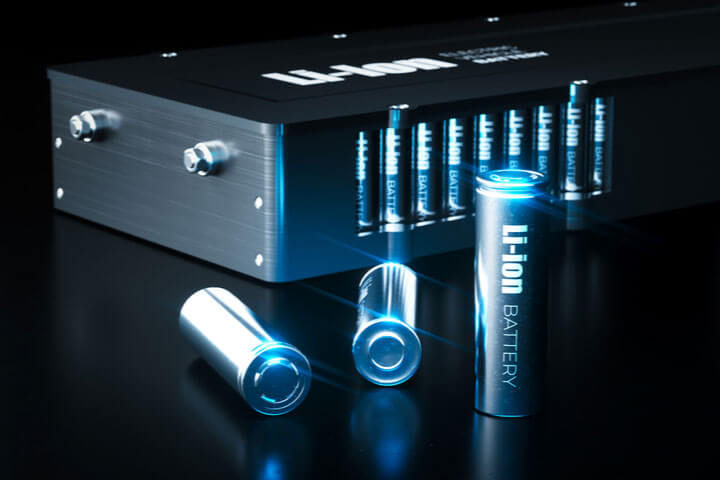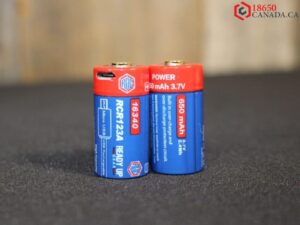Renewable energy sources, such as solar and wind power, have gained significant traction in our quest for a sustainable future. To harness the full potential of these clean energy sources, efficient energy storage solutions are crucial. This is wherein lithium-ion batteries come into play. In this article, we will explore the pivotal role of lithium-ion batteries in empowering renewable energy systems and revolutionizing the way we generate, store, and utilize green energy.
This article delves into the pivotal role of lithium-ion batteries in the realm of renewable energy. It explores the definition and composition of lithium-ion batteries, highlighting their advantages such as high energy density and long lifespan.
The article discusses the integration of lithium-ion batteries in renewable energy systems, including grid-scale energy storage, off-grid power systems, and electric vehicle charging infrastructure. It also covers advancements in lithium-ion battery technology, sustainability considerations, and emerging battery technologies. The article concludes by emphasizing the importance of lithium-ion batteries in empowering a sustainable future for renewable energy.
Importance of Renewable Energy
The transition to renewable energy sources is vital for combating climate change, reducing greenhouse gas emissions, and achieving energy sustainability. Renewable energy technologies offer a clean and abundant alternative to fossil fuels, providing a path toward a greener and more resilient energy future.
Role of Lithium-Ion Batteries in Renewable Energy Systems
Lithium-ion batteries play a vital role in renewable energy systems by enabling efficient energy storage. They bridge the gap between intermittent renewable energy generation and consistent power supply, ensuring a stable and reliable energy flow. These batteries serve as the backbone of grid-scale energy storage, off-grid power systems, and electric vehicle charging infrastructure, contributing to the widespread adoption of renewable energy.
Understanding Lithium-Ion Batteries
Definition And Composition of Lithium-Ion Batteries
Lithium-ion batteries are rechargeable energy storage devices that utilize lithium ions as the primary means of energy transfer. They are composed of one or more cells, each containing a positive electrode (cathode), a negative electrode (anode), and an electrolyte solution. The use of lithium compounds as electrode materials allows for high energy density and efficient energy storage.
Advantages of Lithium-Ion Batteries For Renewable Energy Storage
Lithium-ion batteries offer several advantages that make them ideal for renewable energy storage. They have a high energy density, allowing for compact and scalable energy storage systems. These batteries also exhibit excellent cycling efficiency, enabling multiple charge-discharge cycles with minimal energy loss. Additionally, lithium-ion batteries have a long lifespan, making them a reliable and durable choice for renewable energy applications.

Applications of Lithium-Ion Batteries in Renewable Energy Systems
Lithium-ion batteries find widespread applications in various renewable energy systems. In grid-scale energy storage, they serve as a crucial component for balancing energy supply and demand, smoothing out fluctuations in renewable energy generation. Off-grid and remote power systems, such as those used in rural areas or during emergencies, rely on lithium-ion batteries for reliable and independent power supply. Furthermore, electric vehicle charging infrastructure heavily relies on lithium-ion batteries to store and deliver energy efficiently.
Integration of Lithium-Ion Batteries in Renewable Energy Systems
Grid-Scale Energy Storage
Grid-scale energy storage systems help optimize the utilization of renewable energy by storing excess energy generated during periods of high production and releasing it during times of high demand. Lithium-ion batteries provide the necessary energy storage capacity, allowing for efficient energy management and grid stability.
Off-Grid and Remote Power Systems
In off-grid and remote locations where access to traditional power grids is limited or non-existent, lithium-ion batteries offer a reliable and sustainable energy solution. These batteries store energy generated from renewable sources, such as solar panels or wind turbines, and provide a consistent power supply, even during periods of low or no generation.
Electric Vehicle Charging Infrastructure
As the electrification of transportation continues to gain momentum, the demand for efficient electric vehicle charging infrastructure rises. Lithium-ion batteries play a vital role in this domain by storing and delivering energy to charging stations. Fast-charging capabilities and high energy density make lithium-ion batteries an ideal choice for electric vehicle charging, enabling convenient and rapid refueling.
Advancements in Lithium-Ion Battery Technology For Renewable Energy
Increasing Energy Storage Capacity
Continuous advancements in lithium-ion battery technology focus on increasing energy storage capacity, allowing for more extended periods of energy supply. Researchers are exploring innovative electrode materials and cell designs to enhance the energy density of lithium-ion batteries, unlocking new possibilities for renewable energy storage.
Improving Battery Lifespan and Durability
The lifespan and durability of lithium-ion batteries are crucial factors in renewable energy systems. Scientists and engineers are working towards developing battery chemistries and management systems that extend battery life and enhance durability. These advancements ensure the long-term performance and cost-effectiveness of renewable energy storage solutions.
Enhancing Efficiency and Charging Capabilities
Efficiency and charging speed are vital aspects of lithium-ion batteries in renewable energy systems. Ongoing research aims to improve the charging efficiency of these batteries, reducing charging times and maximizing energy utilization. Furthermore, advanced battery management systems and smart charging algorithms enhance the overall efficiency and performance of lithium-ion batteries in renewable energy applications.
Environmental Impact and Sustainability Considerations
Life Cycle Analysis of Lithium-Ion Batteries
When evaluating the environmental impact of lithium-ion batteries, a comprehensive life cycle analysis is essential. This analysis considers the environmental footprint of battery production, operation, and end-of-life management. It helps identify opportunities to reduce the environmental impact associated with the entire life cycle of lithium-ion batteries.
Recycling and Second-Life Applications
To mitigate environmental concerns, proper recycling and second-life applications of lithium-ion batteries are crucial. Recycling processes recover valuable materials and reduce the need for raw material extraction. Moreover, repurposing retired batteries for secondary applications, such as stationary energy storage, can extend their useful life and contribute to a more sustainable energy ecosystem.
Exploration of Greener Battery Technologies
While lithium-ion batteries offer numerous advantages for renewable energy storage, the exploration of greener battery technologies is ongoing. Researchers are actively investigating alternative battery chemistries, such as solid-state batteries and flow batteries, that offer improved sustainability, enhanced safety, and increased energy storage capacity.
Challenges And Future Prospects
Cost Considerations And Economic Viability
As with any technology, cost considerations play a significant role in the widespread adoption of lithium-ion batteries for renewable energy storage. Continued research and development aim to reduce production costs, improve manufacturing processes, and increase economies of scale, making lithium-ion batteries more economically viable for a broader range of applications.
Safety And Regulatory Aspects
Safety remains a critical aspect of lithium-ion battery deployment in renewable energy systems. Stricter safety regulations, improved battery management systems, and ongoing research in thermal management and safety features ensure the safe and reliable operation of lithium-ion batteries. It is crucial to address safety concerns and implement proper guidelines to safeguard users and the environment.
Exploration of Emerging Battery Technologies
While lithium-ion batteries dominate the renewable energy storage market, the exploration of emerging battery technologies holds promise for the future. Solid-state batteries, flow batteries, and other advanced energy storage technologies offer potential advantages in terms of energy density, safety, and scalability. Continued research and development in these areas may pave the way for even more efficient and sustainable renewable energy storage solutions.
BAK N21700CG and Samsung 26H Lithium-ion Batteries for Renewable Energy
In the realm of renewable energy, lithium-ion batteries are paving the way for a sustainable future, with notable contenders like the BAK N21700CG 15A 5000mAh and Samsung 26H 18650 Battery leading the charge.
These powerful batteries play a vital role in harnessing and storing renewable energy efficiently. The BAK N21700CG 15A 5000mAh battery boasts high discharge capabilities and a generous capacity, making it an ideal choice for energy storage systems powered by solar or wind energy.
Similarly, the Samsung 26H 18650 Battery excels in delivering reliable power in various renewable energy applications. With their impressive energy density and long cycle life, these lithium-ion batteries enable a smooth transition toward a greener future by providing sustainable and dependable energy storage solutions.
Termination
Lithium-ion batteries have emerged as a game-changer in the realm of renewable energy storage, empowering a sustainable future. Their high energy density, long lifespan, and efficient charging capabilities make them indispensable in renewable energy systems. However, it is vital to address environmental considerations and explore greener battery technologies to ensure a truly sustainable energy ecosystem. With ongoing advancements, lithium-ion batteries will continue to play a crucial role in empowering the future of renewable energy.
FAQs
How Long Do Lithium-Ion Batteries Typically Last in Renewable Energy Systems?
The lifespan of lithium-ion batteries in renewable energy systems depends on various factors, including usage patterns, depth of discharge, and maintenance practices. Generally, these batteries can last for 5 to 15 years or more, providing reliable energy storage throughout their lifespan.
Can Lithium-Ion Batteries Store Energy From Intermittent Renewable Sources?
Yes, lithium-ion batteries are well-suited for storing energy from intermittent renewable sources. They can efficiently capture excess energy generated during periods of high production and release it during times of low or no generation, ensuring a stable and continuous power supply.
Are There Any Limitations to the Use of Lithium-Ion Batteries in Renewable Energy Systems?
While lithium-ion batteries offer numerous benefits, they do have some limitations. These include their finite lifespan, the need for proper management and maintenance, and environmental considerations associated with battery production and disposal. It is essential to address these limitations through responsible usage and sustainable practices.
What Are the Environmental Benefits of Using Lithium-Ion Batteries in Renewable Energy?
Using lithium-ion batteries in renewable energy systems helps reduce dependence on fossil fuels and mitigates greenhouse gas emissions. By storing excess energy from renewable sources, these batteries enable a more efficient and sustainable energy ecosystem, contributing to a cleaner and greener future.
How Can I Contribute to the Sustainable Use of Lithium-Ion Batteries in Renewable Energy?
As a consumer, you can contribute to the sustainable use of lithium-ion batteries in renewable energy by practicing responsible battery management. This includes proper recycling of old batteries, supporting certified recycling programs, and exploring second-life applications for retired batteries. Additionally, educating yourself about energy-efficient practices and supporting advancements in greener battery technologies can make a positive impact on the overall sustainability of renewable energy systems.

